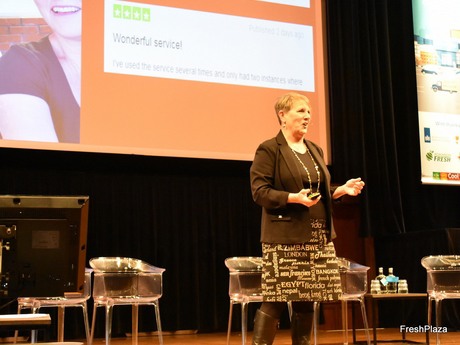A leading brand strategist believes fresh produce cannot be treated in the same way as Consumer Packaged Goods (CPG) if it is going to be successful in the online world.
"I am of the philosophy that we have to crack the code here, but we won't crack the produce code, by treating it as a CPG," Fresh Produce Marketing Owner Lisa Cork said. "The company that starts to win in the produce game is the one that understands what makes produce unique, and is able to harness that and bring it to life online."
She went on to tell the Amsterdam Produce Summit that one of the difficulties is not only that is it fragile, making transportation a challenge, but with the unique nature of every piece of fruit, the eating experience will be at least slightly different each time.

"Because of its uniqueness, it impacts its ability to be successful in a normal way in an omni-channel environment," Ms Cork said. "As much as we think that we are putting out the same piece of produce every single day; the reality is different growers, different regions, different seasons and different countries which means that produce is rarely the same. That brings unique challenges not only in product descriptors, but consumers taste expectations."
Ms Cork explains that fresh produce is largely varietal, which means that it can look the same, but be quite different. For example, she points out that she found 72 variations of apples on the Amazon Fresh website, not just different varieties, but even from organic to different pack sizes - but they all look very similar.
Another factor that complicates online sourcing is the many different producers in different countries. While in the CPG world there is a small number of conglomerates looking after 20-30 brands - in the produce world there might be 120 growers representing one category, so expressing origin becomes difficult.
"This simply isn't good enough for shoppers who are shopping online," she said. "When you deep dive into a category like apples online, there is no information. So, nothing to tell me crispy, nothing to tell me sweet, nothing to tell me about the 72 variants. It left me with too much choice."
Ms Cork believes that now that this fundamental change has started the omni-channel environment is here to stay, and history has shown that it will only be embraced and further developed by young generations, just like self-serve stores in the early 1900s. However, she does not think omni-channel is not quite the right option for fresh produce companies - yet.
"I, 100 per cent, stand by my statement that omni-channel retail is bad for produce brands...currently, unless that brand is being brought to life in China," she said. "When I actually went into the research, I found what I am going to call a 'brand gap', but in reality, it was actually a 'brand chasm', or 'brand abyss'. There is a huge black hole that exists between a how a brand showcases itself offline versus how it showcases itself online."
She brought up a number of instances showing how a brand loses control of itself in an online environment, and says it can lead to loss of sales, loss of brand value, loss of premiumisation, and it creates a serious risk for retailers to move into private label branding.
In her examples, products were being placed alongside generic product descriptions and photos which did not showcase much difference between the premium brand and a cheaper 'no-name' brand. While in some cases premium products are being displayed at a higher price, with no explanation of why the more expensive product is actually higher in quality. Ms Cork says this loss of control should be worrying to businesses.
"I want you to see the risk that we are facing when we lose control of a produce brand online," she said. "When you lose the ability to tell the brand's story and when you lose the ability to talk about the investment the company makes to make the product big and beautiful and taste amazing, and that gets placed alongside a generic product, you open the door for private label risk. We need to be fighting for our share of the conversation about how our brand is manifested online. The ability to put up a brand with a no name grower, no name origin a no name differentiator is easier than managing multiple brands that have something to say. But taking the easy road is the destiny that we are given. We have to be exploring branded solutions."
The one country where this is not the case, according to Ms Cork is China, where brands are revered and smart marketers who invest in the brand to bring it to life for consumers, are taken care of by the retail environment.
